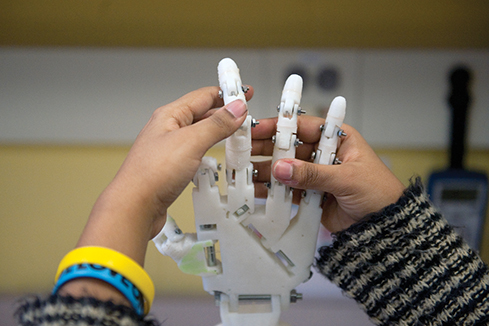 Summer 2015
Summer 2015|
Making It Count
A local high school student and awardwinning entrepreneur is using her computer- science smarts and enterprise to change peoples’ lives. When Ananya Cleetus walked into last year’s White House Science Fair as one of its 32 presenters, she felt a little overwhelmed. Bill Nye the Science Guy, a longtime hero, was wandering from project to project with his wife. A Girl Scout troop of 8-year-olds was presenting their flood-proof bridge design (“All I remember doing when I was that age in Girl Scouts was eating cookies,” says Cleetus). And a teenage scientist was sharing her research into the rare liver cancer she endured as a child.
“Oh my goodness,” Cleetus remembers thinking. “These people have such incredible projects and all I have is this hand.” The hand in question was neither Cleetus’ left nor right, but a robotic prosthetic she had designed, 3-D printed, and programmed herself, intended to be available to those suffering from leprosy in India. The Upper Saint Clair resident was just 17 at the time. “I come from a family of artists: my father paints, my mom’s a librarian, and I’m sort of at the other end of the spectrum,” says Cleetus. “I’m really interested in finding ways to make all of that accessible to people.” Now a high school senior, Cleetus is also CEO of her own social-media network that connects young inventors like herself with mentors in their fields of interest. For that she earned Carnegie Science Center’s 2015 Start-Up Entrepreneur Award. Nominations for the annual awards can come from anywhere, but past winners choose the next batch of recipients, says Gina Fisher, development manager at the Science Center. “The awards mean a lot because they’re being decided by people who are immersed in that field.” Cleetus’ network—dubbed “Magikstra” with the playful tagline that reads “No Tricks, Just Connections”—is the LinkedIn of the pre-professional world. Cleetus conceived of the idea while trying to find someone— anyone—to help her advance her interest in assistive technology. “I ended up having to write a lot of emails to professors at Pitt and Carnegie Mellon, and I realized what a time-consuming and frustrating process that was,” she says. Like other young creators, Cleetus is an autodidact; with a reliable Internet connection and enough time, it’s possible to learn just about anything. But there’s nothing like having a human being to help identify resources, act as an informed sounding board, or suggest next steps to move from learning to doing, she says. “There are so many ideas that people have … but it takes a lot to be able to make those ideas a reality,” she says. “Hopefully, a resource like Magikstra will make it easier for students to create some of their own ideas.” The network is currently in beta testing at five universities. Ruthe Farmer spends much of her time building that same kind of potential-rich network as chief strategy and growth officer for the National Center for Women & Information Technology (NCWIT), an organization that works to create a gender balance in technology and computing. “The simple fact is that most technology is being created without the input of women and it’s not going to be the best tech it could be,” says Farmer. “Ananya [a 2014 recipient of NCWIT’s Award for Aspirations in Computing] is a great example of a young person applying her interests and aptitudes to the greater good.” In a sense, the difference between creating or not creating, doing or not doing, can be a matter of emotional capital. For as long as she can remember, Cleetus has wanted to learn more about the world around her. “My parents were pretty supportive in letting me destroy things so I could figure out what was inside them,” she laughs. But curiosity is merely the on-ramp to her impressive resume. Already teaching a fully-accredited robotics course for middleschoolers at a partner school district, Cleetus is described as “driven” by peers, mentors, and colleagues twice her age. Her ability to conceive of a different reality sets Cleetus apart, says Rich Lunak, CEO of Innovation Works and head of the Start-Up Entrepreneur committee that chose Cleetus as their Science Award winner. “My parents were pretty supportive in letting me destroy things so I could figure out what was inside them.”
- Ananya Cleetus“When you think about great entrepreneurs, they’re people that make lasting impacts in our society. You need that vision and drive and dogged determination to do things other people think are impossible,” Lunak says. “She’s got that spark.” A few years ago, while visiting her grandparents in India, a family member told Cleetus about the Jaipur Foot, a prosthetic given away free of cost. At the project’s New Delhi facility, she was blown away by the foot’s impact. “A lot of these people had jobs as a rickshaw driver or a construction worker, jobs that required manual labor,” she says. “A prosthetic meant the difference between being able to support a family and having an income or not.” With the help of a mentor at Carnegie Mellon, Cleetus conducted research on the Jaipur Foot, even patenting an improvement: a spring lever added to the ankle joint that made the foot more dynamic, foot-like, and effective. That initial project fueled Cleetus’ work combining prosthetics and robotics to create a hand for those living with leprosy. India accounts for more than 50 percent of all new leprosy cases each year, according to the International Federation of Anti-Leprosy Association. “In my mind, science with no actual application or that never leaves the lab isn’t really science,” Cleetus asserts. She’ll be heading to a yet-to-be-decided university this fall to study business and computer science. “You can see creativity seep through in everything she does,” says Calla Carter, a firstyear computer science major at Bryn Mawr College who nominated Cleetus for the Science Center award. The two met through NCWIT and they’ve hung out at a few meetups and organized a hackathon. “She has that value of seeing things differently, of going about things in a different way. And I think that really is the key to innovation.”
|
Saving the Songbird · Before They Were Famous · Visually Telling · Cosmic Bling · Special Section: A Tribute to Our Donors · President's Note · NewsWorthy · Face Time: Cecile Shellman · Artistic License: Born to Paint · Travel Log · The Big Picture
 |
Copyright © 2017 CARNEGIE Magazine. All rights reserved. |


